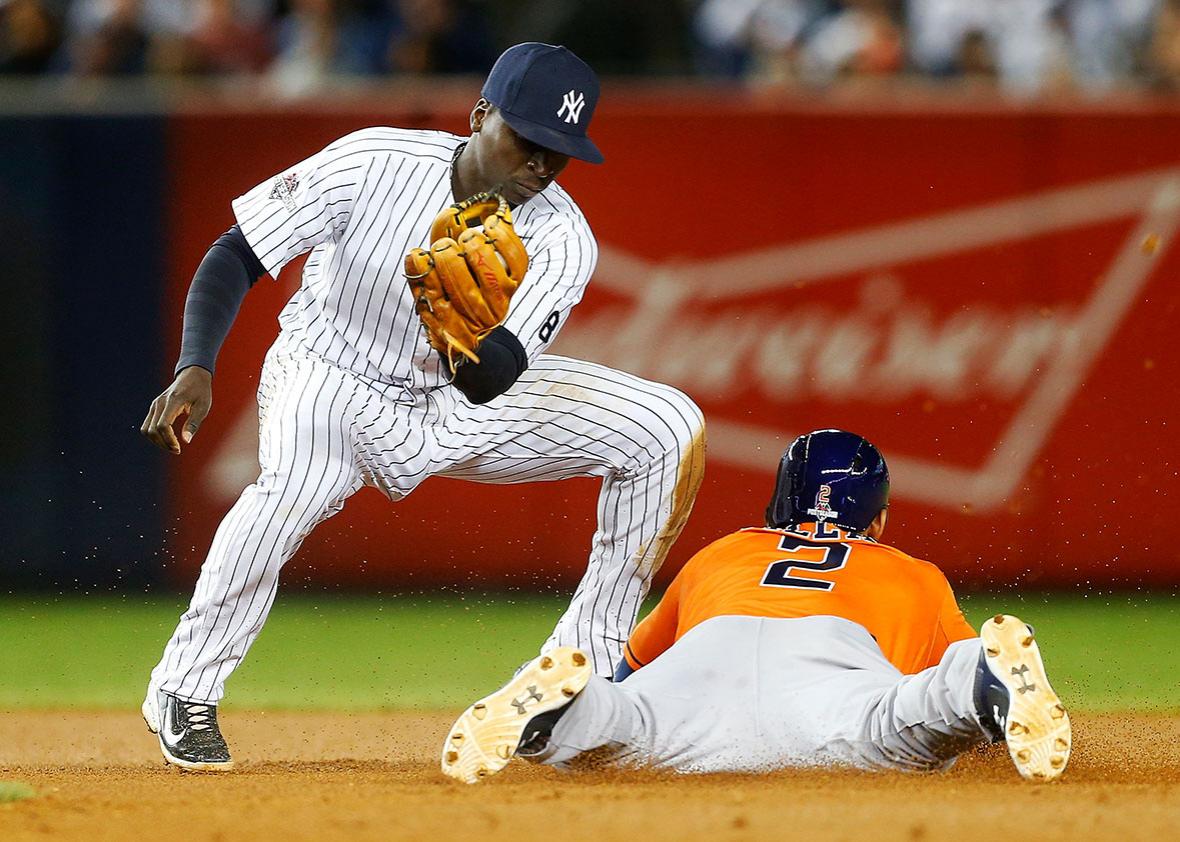A one-game baseball playoff is an unnatural thing. Teams are built around a five-game cycle, and the best of them still lose 1 in 3 games. This year’s Chicago Cubs—the best team in baseball—won just 64 percent of their games. After a six-month season, a nine-inning trial feels as disjointed from the flow of baseball as a penalty shootout is from the rhythms of soccer. It’s an abbreviated finale that also rewards a slightly different set of skills.
But somehow, Major League Baseball’s one-game wild-card playoff works. Unlike soccer’s penalty shootout, the playoff amplifies baseball’s strategy, tension, and charm. If you have friends who think baseball is boring (and who doesn’t?), friends who don’t care for the wasted 0–2 pitch in the dirt, the lefty-lefty matchup, the shift—these are two games that will convince them otherwise.
The fifth edition of MLB’s new wild-card format starts on Tuesday night with a do-or-die game between Baltimore and Toronto. Expect a significant portion of Canada to be watching as the O’s visit the Rogers Centre. On Wednesday, the San Francisco Giants–winners of the World Series in 2010, 2012, and 2014—will drop in on the reigning National League champion Mets in Queens, New York.
The single-game playoff, which debuted in 2012, was an overdue correction to the problems created by the original wild-card format in 1994, under which three division winners plus one wild-card team made the playoffs in each league. By pitting wild-card teams against each other, the new format cleans up some of the bad incentives of the old regime. It gives regular-season front-runners a reason to stay out in front, lest they fall into a single-elimination game, and it gives middling teams a reason not to give up on their seasons, because the second wild card is available. (After getting the second wild-card berth in 2014, the San Francisco Giants won the World Series.) Each wild-card–playoff winner progresses to a best-of-five against its league’s best team.
I went to one of these games last year, in the Bronx, where the Yankees hosted the Houston Astros. The Yanks had bobbled away an improbable midsummer division lead to the superior Blue Jays and been relegated to hosting a young Astros team for one game at Yankee Stadium. The home team played terribly, helplessly, managing just three hits and no runs.
What I remember, though, was how the crowd—even in that airy new stadium, where the ushers come to your seat to check your ticket as if they were conductors on an Amtrak train—was riveted by the game’s minutiae. I never saw Yankee Stadium stand up for a one-out, seventh-inning walk before. But that night, we were rapt. Even the inevitable eighth-inning boos for Brett Gardner’s three-strikeout, 0-for-4 performance were delivered with gusto, not surly resignation.
This was baseball at high stakes, and each pitch was endowed with a kind of electric desperation that the sport, in which there is always one more game, too often lacks.
Given the small sample size, we shouldn’t make too much of the past games. (That the away team is 6–2, for example, seems like a fluke.) I also wouldn’t place too much stock in the fact that the games haven’t been so competitive. Aside from a slugfest between Oakland and Kansas City in 2014, which finished 9–8 in 12 innings and featured six lead changes, in only one of the seven games (when the Cards won in Atlanta in 2012) did the losing team ever hold the lead.
What does make sense is that the games have been low-scoring, and four of them have been shutouts. Teams start their best pitchers. Wednesday’s matchup between the Mets’ Noah Syndergaard and the Giants’ Madison Bumgarner has the makings of a taut pitcher’s duel.
I know fans don’t think they want to see games where the positioning of the outfielders is what passes for action. Certainly, the one-game format, with a day off before and after, is conducive to the kind of finicky bullpen management that can drown a tense inning in commercial breaks. But a sudden-death game does spotlight the aspects of baseball—a long at-bat, say, or a hit-and-run—that fans quietly savor during the summer. Those little stratagems can seem silly and unnecessary on an August afternoon; in a one-game playoff, their importance is obvious. Those, more than the home runs, are the facets of the game that turn casual fans into scorekeeping aficionados.
There’s a big-picture reason to like the games, too. Even with the one-game wild card, baseball lets fewer teams progress to the playoffs than football, basketball, or hockey. The league sacrifices little in quality to include one more team. And if this game does represent a perversion of the sport’s meandering pace, it is not so different from what’s presented by the five- and seven-game series that follow, with their shortened rotations and frequent off-days. The wild-card game does not exist in isolation: Those Astros may have beaten my Yankees, but by starting their ace Dallas Keuchel in the Bronx, they were able to use him only once in the subsequent five-game series against Kansas City, which they lost.
That America doesn’t tune in for five- and seven-game baseball playoff series is an issue for another day. (Thursday, to be exact, when the AL Division Series starts.) For now, baseball fans should relish that these one-game playoffs routinely draw a bigger television audience than their division series counterparts. The Cubs-Pirates game last year was the highest-rated broadcast on TBS in five years. The Yankees-Astros game was the most-watched baseball game on ESPN since 2003. And neither of those was even a good game, the kind of game where I’d text my dad and ask simply: Are you watching this?
What they have is simply the suspense of a whole year of play turning on one night. Whatever they lack as an appropriate conclusion to the summer circuit, they make up for as a thrilling start to the postseason.
